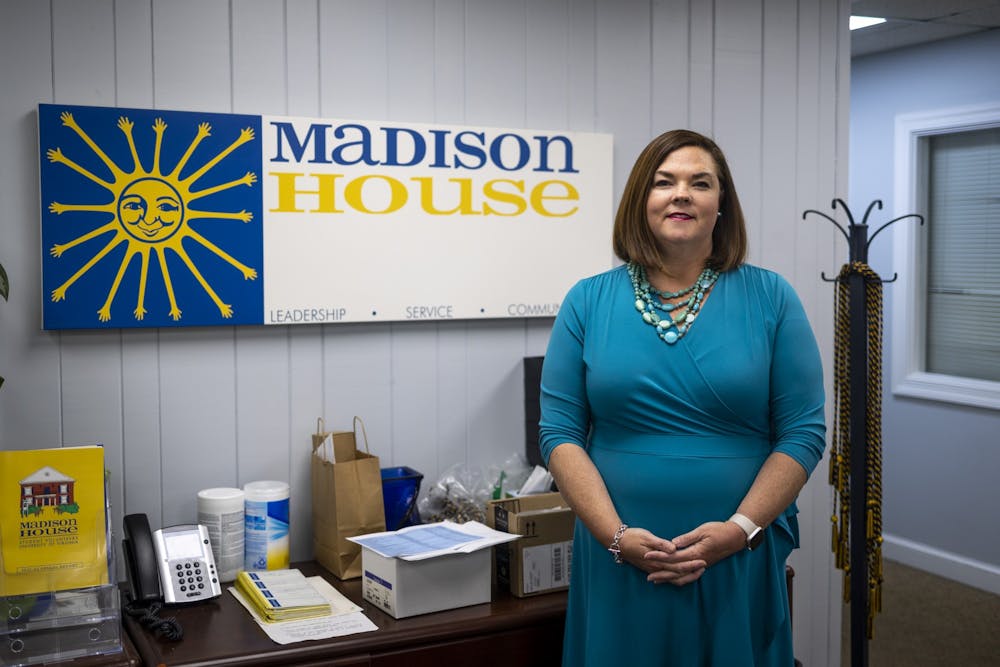After seeing the positive impact of Madison House in the Charlottesville community while working as a teacher and principal in Charlottesville City Public Schools, Stephanie Carter will take office in June as the new executive director. With years of experience in education under her belt and a passion for serving the community, Carter said she strives to strengthen the organization’s relationship with local groups, further connect volunteering with academic pathways and increase student involvement.
Carter said during her time with the organization, she hopes to fulfill the core principles of Madison House — evaluating and improving the ways that students serve the community — while also increasing the center’s fundraising efforts.
Carter has previously served as the principal at Buford Middle School and director at Charlottesville-Albemarle Technical Education Center. As a secondary educator, she said she was inspired by Madison House’s mission to empower students and volunteers and foster the educational and personal growth of the Charlottesville community.
“Providing service to the community is critical to my own professional satisfaction, so Madison House just seemed like a natural fit to me,” Carter said.
Madison House is a volunteer center for University students that organizes volunteers, educates leaders, forms community collaborations and encourages lifetime volunteerism, according to the website. More than 3,000 students currently volunteer with the center.
The executive director position oversees all operations of Madison House, including assisting the center in meeting the needs of the Charlottesville neighborhood and leading and guiding the team of staff and student volunteers.
Carter said she is excited to join the team of directors and to better understand Madison House’s operations. She believes it’s essential to understand the priorities of the center’s partners, which allow students at the University to volunteer and strengthen connections with Charlottesville families and school communities through charitable activities. Current partners include the U.Va. Health System, schools in Albemarle County and the Charlottesville community.
“Building relationships is at the heart of the work, and I think it's really important to understand the priorities of community partners and then design programs and services to meet those critical needs,” Carter said.
Carter said she strives educational activities such as tutoring, mentoring and child care in the Charlottesville neighborhood, as well as extend the University’s partnerships through programs such as animal and environmental services, human services and medical services.
Carter said she won’t make any significant changes as the incoming executive director because she doesn’t want to implement changes without first understanding the organization. In addition to familiarizing herself with new leaders, staff and rules, Carter said she values the relationship between students’ academic pursuits and opportunities in the real world.
“As an educator, I know that connecting doing to learning and increasing relevance of academic content is one of the best ways we can expand and deepen educational experience,” Carter said
Currently, students who are especially interested in public service can take on a Public Service Pathway partnering with Madison House — a new program introduced this year, which incorporates public service into the University’s student experience through research and service opportunities, community partnerships, internships and mentorship. The program is meant to help students obtain experiences that support their dedication to public service.
“In addition to expanding faculty partnerships through community-engaged learning, we’re also seeking new ways to partner with U.Va. student groups and continuing our involvement with Public Service Pathways,” Carter said.
Outside of volunteering during the academic year, students can also become involved with Madison House in the summer. Madison House offers short-term placements for students who are staying in Charlottesville over the summer and wish to volunteer. Carter said there are many students who either begin or continue their volunteer placement over the summer months.
Carter also said there are opportunities for students to become involved even if they aren’t physically in Charlottesville.
“If you can't just be a full-time volunteer, you can engage with our social media or attend community events in the community,” Carter said. “Those are just more ways to be involved over the summer.”
Sherri Moore, co-chair of Madison House Board of Directors and McIntire professor, said in an email statement to The Cavalier Daily that the Board is excited to welcome Carter into the role — especially considering her well-known dedication to education in the Charlottesville community.
“She possesses a genuine passion for ensuring the success of students,” Moore said. “The Board looks forward to working with her, and we are confident that she will take Madison House to new and exciting levels.”
Carter will succeed interim executive director Emily Wampler and officially begin her new role in June.







